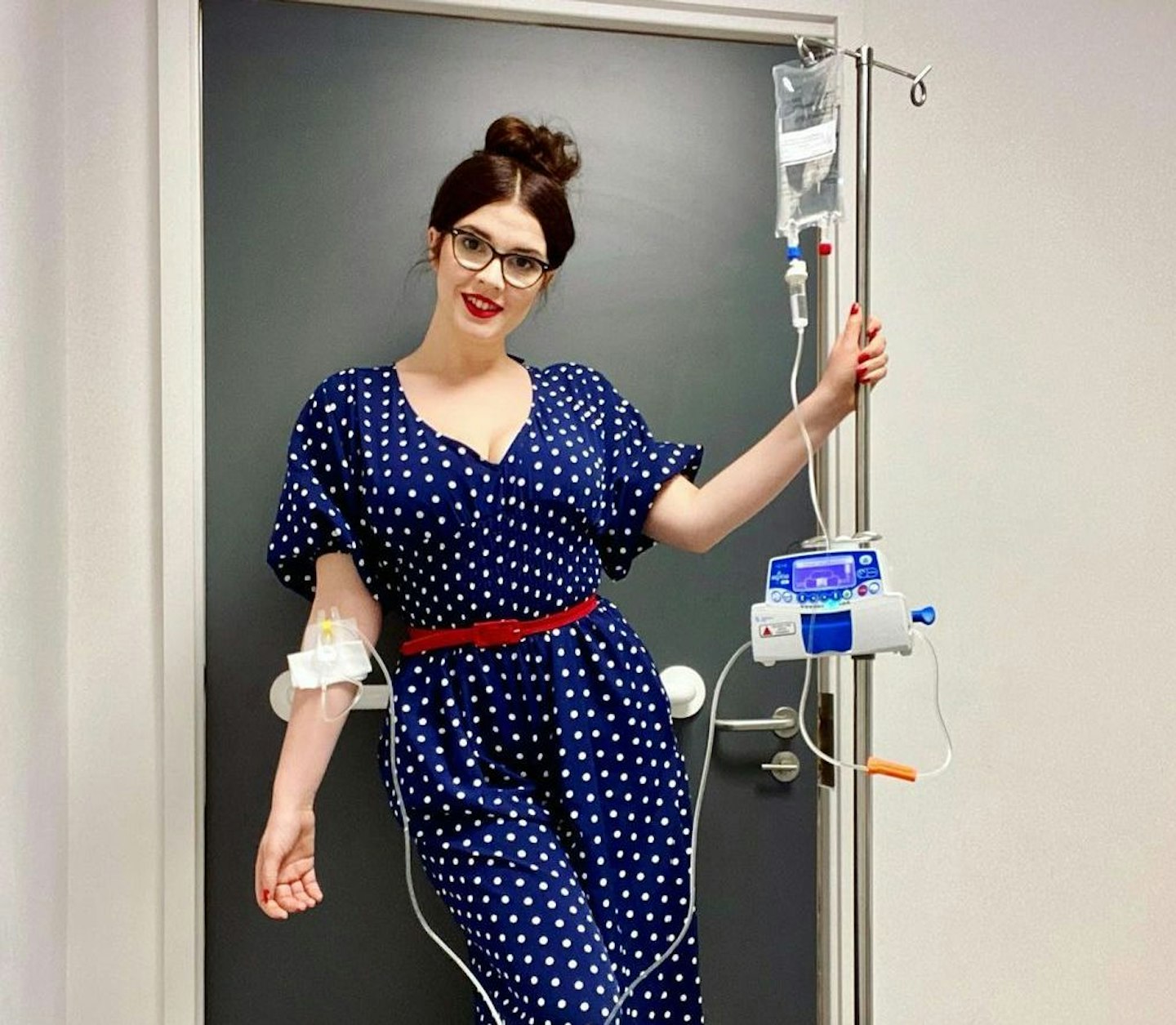If you've ever experienced IBS, you'll know how debilitating it can be when you get a flare-up, so it's important to know more about the triggers and treatments. IBS stands for Irritable Bowel Syndrome, and it's a fairly common condition which affects the body's digestive system.
It can cause stomach cramps, bloating, constipation and diarrhoea. Unfortunately, there's no cure, and it's likely to be a lifelong problem. However, symptoms come and go and they can be controlled by diet and lifestyle changes. These insights from experts and people who are managing their symptoms effectively can help you understand what works best for you.
In most cases, the cause cannot be traced, but it's often linked to oversensitive nerves in your gut, stress and a family history of IBS. To dig a little deeper into IBS, we spoke to Karine Patel, Registered Dietitian and Nutritionist for Dietitian Fit & Co to find out more about the symptoms, causes and ways to prevent your IBS from flaring.
What is IBS?
Irritable bowel syndrome (IBS), also known as irritable colon, is a common gastrointestinal disorder that affects the digestive system, mainly the large intestine.
What are the symptoms of IBS?
Symptoms can come and go, as they are triggered by certain foods and drinks. Symptoms of IBS can vary from one person to another and they can also vary from day to day. But the most common ones are the following:
• Stomach cramps - these usually get better after passing stool.
• Bloating
• Excessive wind/ gas
• A change in the bowel, such as constipation or diarrhoea and sometimes can vary between the two.
• Stomach pain or cramps (usually gets worse as the day goes by)
• Fatigue, lack of energy
How is it diagnosed?
While there is no specific test that exists to diagnose IBS, it is often diagnosed based on your symptoms. Your GP will often recommend some tests to rule out other possible gut diseases such as a blood test to rule out coeliac disease or have a stool test to rule out Crohn's Disease or Ulcerative Colitis. Another term for this condition is Inflammatory Bowel Disease (IBD) and the symptoms of IBD are very similar to that of IBS. However, the best way to monitor and identify if you have IBS is through an elimination diet called FODMAP.
What changes can you make to help IBS?
There are certain foods you should eat and avoid if you have IBS, these IBS diets can help your body reduce the risk of a reaction. You can trythe FODMAP diet to identify the foods that your body can’t digest well and that cause the symptoms. The FODMAP diet is considered the best and the most effective treatment for IBS.
-
Eat smaller meals more frequently
-
Cook your vegetables
-
Avoid fizzy drinks
-
Manage stress levels
-
Engage in physical activity daily and be more active
-
Lower caffeine intake to avoid stimulating the symptoms
-
Some gut probiotics may help to reduce symptoms as well
How to manage the symptoms?
We spoke to Scarlett Luxe, a UK-based vintage inspired model who was diagnosed with Crohn's Disease when she was 15, about living with IBD, a condition with very similar symptoms to that of IBS. The main difference is that IBD is inflammation of the bowel which can often cause you to pass blood, whereas IBS is irritation of the bowel which can be caused by many different things such as stress, food and lifestyle.
"My symptoms are mainly abdominal pain, nausea, diarrhoea, blood in my stool and fatigue. I experience some of these symptoms every day but they vary in intensity everyday. With the support of my gastro team, we manage the symptoms with my medication which I take via IV infusion every 6 weeks and it really helps to keep me well and my symptoms at bay," she says.

She shares a few dietary changes that have been helping her in managing the symptoms. "The best food for me when I am flaring up tends to be white food! My gastroenterologist recommended to stick to foods such as chicken, eggs, white rice and yoghurt which calms my symptoms while also getting some nutrients into my body."
"One of the biggest changes was cutting out energy drinks which I used to have when I was feeling ill or tired. However, post diagnosis I realised that they made me feel worse instead of better. I also had to cut down on fibre heavy foods such as beans, wheat & pulses," she adds.
Stressing the importance of listening to your body, she explains that signs like pain or diarrhoea are indicators to slow down or take a step back.
"However with busy schedules, I also have techniques for dealing with symptoms when I may not be able to stop. For example, I take Imodium to stop diarrhoea or Buscopan to relieve pain and bloating," she says.
Is there a link between IBS and stress?
Lucie Hayter, a qualified nutritional therapist and the founder of The Gut Feeling app dedicated to help with gut issues, shared that IBS was recently medically re-categorised as a disorder of gut-brain interaction rather than a simple function issue of 'my gut can't digest this food'.
"Our brains and guts are constantly communicating via something called the gut-brain axis. It's a two way form of communication. So when we're stressed or anxious, we can send signals to our gut which could exacerbate symptoms. Dealing with IBS related symptoms can itself be stressful as well, thereby giving rise to a vicious cycle."
"People with gut issues are often anxious and worrying about where the nearest toilet is in case their symptoms strike. The ordeal of going through an elimination method by ruling out diseases like IBD and Coeliac Disease to arrive at a proper diagnosis can also be stressful while struggling with symptoms," she adds.
Up to one-third of people with IBS also experience anxiety or depression and Reema, an IBS nutritionist expert at Dietitian Fit & Co explains that this stress can influence the intestinal transit time. This means that food can move more quickly or slowly through the digestive system which results in constipation or diarrhoea for some or painful muscle spasms in others.
How to deal with IBS anxiety and stress?
Using comfort food to hep with feelings of stress or anxiety may trigger symptoms in someone who has IBS. Caffeine, alcohol or smoking may also provide temporary relief, but they do not help as a long term coping mechanism. Therefore Reema stresses the importance of finding positive ways to regulate these emotions.
"Keeping a journal to track your stress levels and symptoms can help in recognising patterns and triggers over time. Physical activities like short walks, swimming or following an online dance video at home can keep the mind and body active."
"Improve the quality of your sleep by reducing screen time before going to bed, having a night time routine and sleeping in a dark cool room. If needed, seeking professional help is also advised to work on reducing overall stress and anxiety levels," she adds.
Lucie Hayter's app, The Gut Feeling also encourages people to practise guided activities like yoga, gut directed meditations and breath work that have been clinically proven to reduce the symptoms.
Through it all, Scarlett Luxe believes that one can live a fulfilling life with IBD or IBS.
"Anything truly is possible and I have achieved so much more than I ever thought I could. I have done skydiving, wing walking, modelling and travelling despite having IBD. The most important piece of advice I have is to listen to and learn your body. There is so much advice out there but what works for one person may not work for another. Your body is unique, so learn what triggers you and what soothes you. You've got this," she adds.
Meet The Experts

Lucie Hayter is a registered nutritional therapist and having struggled with her own gut health after a kidney infection, she founded The Gut Feeling, a platform that aims to help anyone going through problems affecting their gut and digestion. This initiative which is also an app is a one-stop destination for expert advice and recipes to maintain a healthy gut. She has been spreading awareness by speaking at events like the IBS World Summit and Microbiome One Health; and has also been featured by the BBC, The Guardian and Health & Wellbeing.

Reema Pillai BSc, MSc is a registered dietitian and IBS nutritionist expert at Dietitian Fit & Co. She is also a member of the British Dietetic Association (BDA). She has worked extensively with weight management, emotional eating (CBT And NLP trained) and chronic diseases like diabetes, cholesterol and high blood pressure. She aims to help people with their diets and eating behaviours by specialising in areas like plant-based diets, FODMAP and IBS diets.
Lorna White is a Senior Digital Writer at Yours.co.uk. She was previously a writer at Yours Magazine writing features and news stories before joining the digital team. Lorna loves the great British countryside and likes to spend her spare time out and about in her home of Nottinghamshire walking her dog, Pippin.
